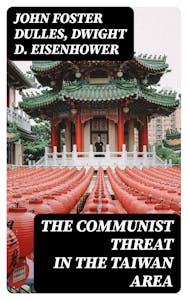In the anthology 'The Communist Threat in the Taiwan Area,' readers are presented with a meticulously curated selection of essays and speeches that vividly encapsulate the geopolitical tensions and ideological confrontations of the mid-20th century. This collection spans a broad array of literary styles, from diplomatic communications to public addresses, collectively unfolding the narrative of the Cold War's impact on the Taiwan Strait and its global implications. The anthology not only charts the evolution of policy and strategy but also serves as a significant documentary record, highlighting pivotal moments and decisions that have shaped the course of international relations in the region. The distinguished contributors, John Foster Dulles and Dwight D. Eisenhower, bring to the collection a profound understanding and firsthand experience of the period's diplomatic and military strategies. As key figures in American foreign policy and defense, their works reflect a nuanced understanding of the complexities of the Cold War era, offering insights into the ideological and geopolitical calculations that informed U.S. policy towards Taiwan and China. Their collective perspectives provide a comprehensive exploration of the strategic imperatives and the dynamic interactions between major global powers of the time. 'The Communist Threat in the Taiwan Area' is an indispensable resource for scholars, students, and enthusiasts of Cold War history, international relations, and Asian studies. The anthology offers a unique lens through which to examine the intricate mosaic of political, military, and diplomatic efforts that defined the period. It invites readers to immerse themselves in the critical analyses and reflective commentary of two pivotal figures in American history, thereby enriching their understanding of the complexities of the era and the enduring significance of the events that unfolded in the Taiwan Strait. This collection not only chronicles historical events but also provokes thought and discussion on the broader implications of these strategies and decisions in contemporary geopolitical contexts.
